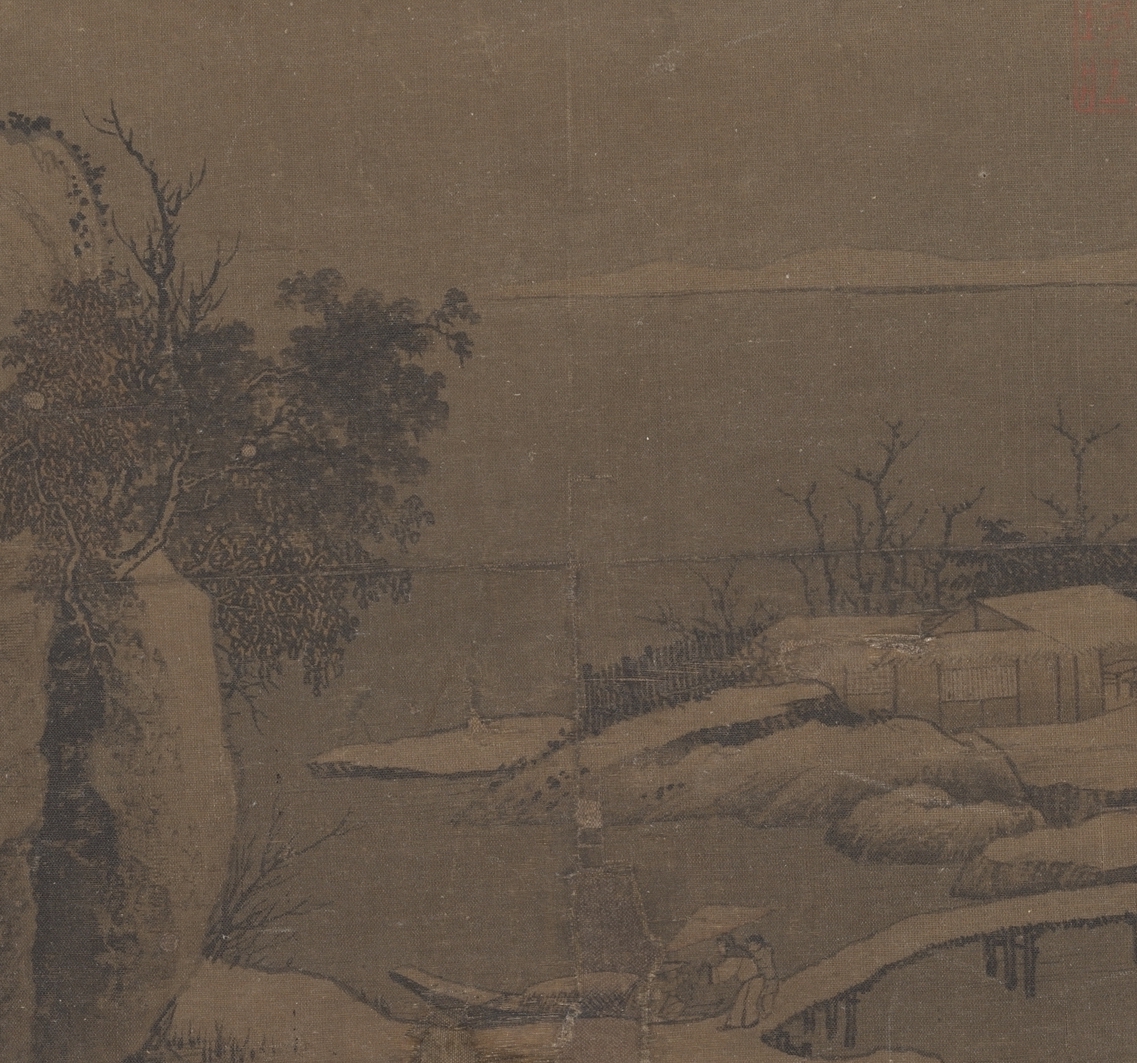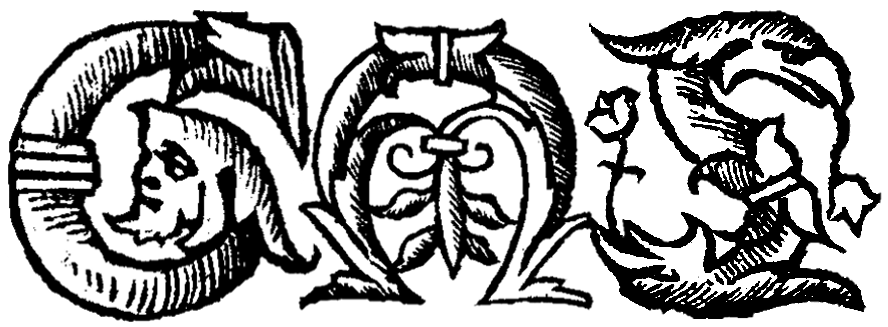To the tune “Strike the Parasol Tree”—“Her deep dimples are fragrantly powdered” | 擊梧桐 · 香靨深深

Detail from _Bridge in Snow_. Late 10th century. China. Ink and color on silk. 9 3/4 x 10 1/4 in. (24.8 x 26.0 cm). The Metropolitan Museum of Art, New York. Object Number 13.100.116. https://www.metmuseum.org/art/collection/search/51399. [Public Domain]
Read the text (PDF)
Introduction to the Text
Like many of Liu Yong’s songs, this one evokes complex emotions. In the first stanza, the male speaker reflects on the past joys of his romantic relationship, culminating in his current anxieties. In the second stanza, he analyzes his lover’s communication and doubts her commitment.
This ci also contains some notable allusions to other works of Chinese literature. Liu Yong alludes to Song Yu 宋玉, a famous composer of songs and rhapsodies from the Warring States period (453–221 BCE), to whom are attributed a number of poems in the Verses of Chu. Song Yu was known as Song Yu of the Orchid Terrace, because he once toured this terrace (presumably in current-day Hubei Province) with the Xiang King of Chu 楚襄王 and documented their conversation in a famous rhapsody, “The Rhapsody of the Wind” (风賦).
The final two lines of Liu Yong’s ci allude to another of Song Yu’s works, the Song of Gao Tang (高唐賦). This song narrates a love affair between the Huai King of Chu 楚怀王 and a mountain fairy which takes place in the king’s dream; in this dream, the mountain fairy describes her residence after their lovemaking as “made from the cloud in the morning, but comprised of rain in the evening”. Both the penultimate line of Liu Yong’s ci, and the image of the “floating cloud” to refer to a beautiful woman, come from Song Yu’s work.
The ci genre of Chinese poetry first emerged in the Sui dynasty (581-619), was further developed in the Tang dynasty (618-907) and matured in the Northern Song dynasty (960-1127). Ci is usually translated into English as “song lyrics”. This is because ci were composed by poets to fit pre-existing tunes. The number of lines, the line lengths, and the tonal and rhythmic patterns of ci vary with the tunes, which number in the hundreds. One common occasion for composing ci would be a banquet: song lyrics would be scribbled down by guests and then sung by musical performers as entertainment. Other occasions for composing and enjoying ci would be more casual: the poet might sing the lyrics to himself at home or while travelling (many ci poets were civil servants of the Imperial Court and often had to travel great distances to carry out their work). Sometimes the lyrics would be sung by ordinary people in the same way as folk songs. This oral and musical quality sets it apart from other genres of poetry in China during the same period, which were largely written texts with more elevated objectives. There are two main types of ci : wǎnyuē (婉约, “graceful”) and háofàng (豪放, “bold”). The wǎnyuē subgenre primarily focuses on emotion and many of its lyrics are about courtship and love, while the háofàng subgenre often deals with themes that were considered more profound by contemporary audiences, such as ageing and mortality, or the rewards and disappointments of public service.
Liu Yong was possibly the most widely-read ci writer in the Northern Song period, with fans ranging from courtesans to officials and critics. He excelled in writing love songs, portraying the emotions of lovelorn individuals in unprecedented detail and depth. Despite being born into a family of officials, he did not lead a successful professional life. After he failed keju, the Imperial Chinese civil service examination, he wrote the song “To the tune ‘Crane Soaring in the Sky’”, in which he claimed that ci poets are as important as prime ministers. This led the Ren Emperor of Song 宋仁宗 to personally deem him unfit for imperial service. The emperor suggested that if he really thought that way, he should just be a ci poet instead
of pursuing the career of an official. The emperor went so far as to deliberately fail Liu Yong in his following attempt at the exams.
Liu Yong’s continued output of poetry, deemed frivolous, trivial and vulgar by court officials, had a lasting impact on his professional life. He did not pass the civil service exam until he was 48 years old; before that, he spent much of his time with singers and courtesans, writing ci and living a hedonistic existence. After he finally passed keju, he worked as a low rank official in several areas and sought to advance his career through the assistance of the prime minister of that time, Yan Shu, who was also a famous ci poet (and is featured in this collection). Yan Shu mocked the frivolity of Liu Yong’s lyrics and refused to assist him, and the emperor, upon learning of his attempt, commented that Liu Yong, as a ci composer, should stick to composing ci. In response to the emperor’s comment, Liu Yong, in typically rebellious fashion, began signing his ci “composer of ci by imperial decree”. He made a final attempt to salvage his career by writing a complimentary ci to the emperor, but this was regarded as offensive and the emperor stripped him of his official titles and stated that he would never be accepted back at court. From then on, he returned to his previous lifestyle, indulging in the company of singers and courtesans.
Because of his unique life experience, the sentiments expressed in Liu Yong’s ci are often very different from the views typically expressed in Chinese society at that time, with an especially cynical attitude towards serving the empire and a pronounced defense of hedonism. Nevertheless, Liu Yong’s ci were extremely popular throughout the empire, giving rise to the frequently repeated observation that “if you can see a well in a place, you can hear Liu Yong’s ci being sung there”. As every tiny town had a well, this indicates the wide reach of Liu’s lyrics.
Liu Yong is also notable for his many formal innovations to ci poetry. Before Liu, most ci were written to accompany short tunes, but he initiated a trend of writing lyrics for longer tunes, which allowed for more complex portrayals of human psychology. He was also less restrained by the tune, and often modified the traditional rhyme as well as the line breaks. For example, even when he wrote two ci to the same tune, they might sound very different from one another, with different rhymes, line lengths or numbers of lines. The tunes that Liu Yong used were also more diverse than those of his contemporaries: some were folk songs, and some he composed himself. Many of Liu Yong’s ci have a stronger narrative element, probably due to the influence of storytellers whose street performances he would have watched. Liu received considerable criticism for his focus on love and for his use of commonplace language rather than a refined poetic vocabulary, but this did little to curtail his popularity or his influence on the development of the ci genre.
About this Edition
The original text of this ci is based on the edition by Tang Guizhang 唐圭璋 ( Quan Song Ci 全宋詞, vol 1. Beijing: Zhonghua shu ju, 1965). Punctuation follows the edition. Since ci poetry rarely includes personal pronouns, and gender-differentiated pronouns did not exist in Classical Chinese of this period, the gender of the speaker as well as their perspective (e.g. first-, second- or third-person) must often be deduced by the translator from context.
Further Reading
Chang, Kang-i Sun. The Evolution of Tz’u Poetry: from Late Tang to Northern Sung. Princeton UP, 1980.
- A standard survey of the early history of Chinese song lyrics (romanized as both ci and tz’u).
Egan, Ronald. “The Song Lyric”. The Cambridge History of Chinese Literature, vol. 1, edited by Stephen Owen, Cambridge UP, 2010, pp. 434-452.
- An overview of the genre.
Owen, Stephen. Just a Song: Chinese Lyrics from the Eleventh and Early Twelfth Centuries. Asia Center, Harvard UP, 2019.
- A recent new history of the genre.
Tang, Guizhang 唐圭璋, editor. Quan Song Ci 全宋詞. Zhonghua shu ju, 1965. 5 vols.
- A comprehensive edition of ci from the Song dynasty and the source text for the ci in this collection (introductions and annotations are in Chinese).
To the tune “Strike the Parasol Tree”—“Her deep dimples are fragrantly powdered” | 擊梧桐 · 香靨深深
擊梧桐
香靨深深,
姿姿媚媚,
雅格奇容天與。
自識伊來,
5 便好看承,
會得妖嬈心素。
臨歧再約同歡,
定是都把平生相許、
又恐恩情,
10 易破難成,
未免千般思慮。
近日書來,
寒暄而已,
苦沒忉忉言語。
15 便認得、
聽人教當,
擬把前言輕負。
見說蘭台宋玉,
多才多藝善詞賦。
20 試與問、
朝朝暮暮。
行雲何處去。
To the tune “Strike the Parasol Tree”
Her deep dimples are fragrantly powdered,
her posture is enchanting;
she is gifted with elegance and extraordinary beauty.
Ever since I met her,
5 I have been treated with care,
and so I knew her bewitching heart (was devoted to me).
Upon parting, we swore to share joy again,1
and promised our lives to each other.
I am still afraid that our love
10 will be easily broken and hard to keep.
I cannot help but have a thousand thoughts and worries.
Recently, her letter came
with only simple greetings.
There are no words of sorrow or earnest concern at all.
15 Thus, I am sure that
she must have listened to others
and plans to throw away her previous promises.
I have heard of Song Yu of the Orchid Terrace,2
who was very talented and excelled in songs and rhapsodies.
20 I’d like to ask him,
every morning and every night,
where did the floating cloud go?3
Critical Notes
-
A euphemism for sex.
-
See discussion in introduction.
-
See introduction for a discussion of these two lines.
